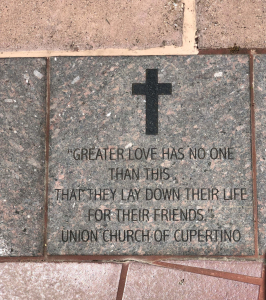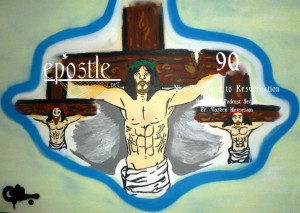Fidelity & Sacrifice
Armodoxy for Today: Advent Series – Fidelity & Sacrifice
The second of the “But I say to you” instructions address adultery. As in the case of murder, once again, Jesus moves the sin from action to thought. “You have heard that it was said to those of old, ‘You shall not commit adultery.’ But I say to you that whoever looks at a woman to lust for her has already committed adultery with her in his heart.”
Jesus’ wish for sincerity is even more accented this time around with this commandment. It is the thought that gives way to action. We see this played out in our lives as well as on the world stage all the time, whether the prejudicial ideas that lead to racism or the unbridled hatred that leads to war, Jesus calls to nip the diseased flower at the bud. However, in context, Jesus was reacting to the hypocrisy that was displayed by the religious elite. Very plainly, he was calling out those who said one thing but lived by another standard. Now, in our hearing, we join the group of “those” and understand he speaks to us all.
After he spoke the Sermon on the Mount, we read the following incident takes place:
… Jesus saw a man named Matthew sitting at the tax collector’s booth. “Follow me,” he told him, and Matthew got up and followed him. While Jesus was having dinner at Matthew’s house, many tax collectors and sinners came and ate with him and his disciples. When the Pharisees saw this, they asked his disciples, “Why does your teacher eat with tax collectors and sinners?” On hearing this, Jesus said, “It is not the healthy who need a doctor, but the sick. But go and learn what this means: ‘I desire mercy, not sacrifice.’… ” (Matthew 9:9-12)
Jesus demands mercy as a condition of love. He reminds us that God is a God of mercy and compassion: “I desire mercy, not sacrifice” (Hosea 6:6) Sacrifice is an action, a show-thing, mercy comes from our innermost self. And now the turn is ours, to push ourselves to a higher consciousness where our thoughts are controlled to thereby thwart evil actions.
As we move further on the Advent journey, your journal becomes a referencing tool for the teachings of Jesus. Without this first step of mercy, compassion is not sincere. Without sincerity of heart, love and loving is merely an act and lacks fidelity.
Today’s prayer comes from our Eastern Orthodox tradition. As I read it, contemplate the number of times the phrase “Have mercy” is said. Consider it as the fundamental and most basic prayer that we, as humans, may offer.
Have mercy on us, O Lord, have mercy on us; for laying aside all excuse, we sinners offer to Thee, as to our Master, this supplication: Have mercy on us. Glory to the Father, and to the Son, and to the Holy Spirit. O Lord, have mercy on us, for in Thee have we put our trust.
Cover: Luna & Gregory Beylerian 2023





